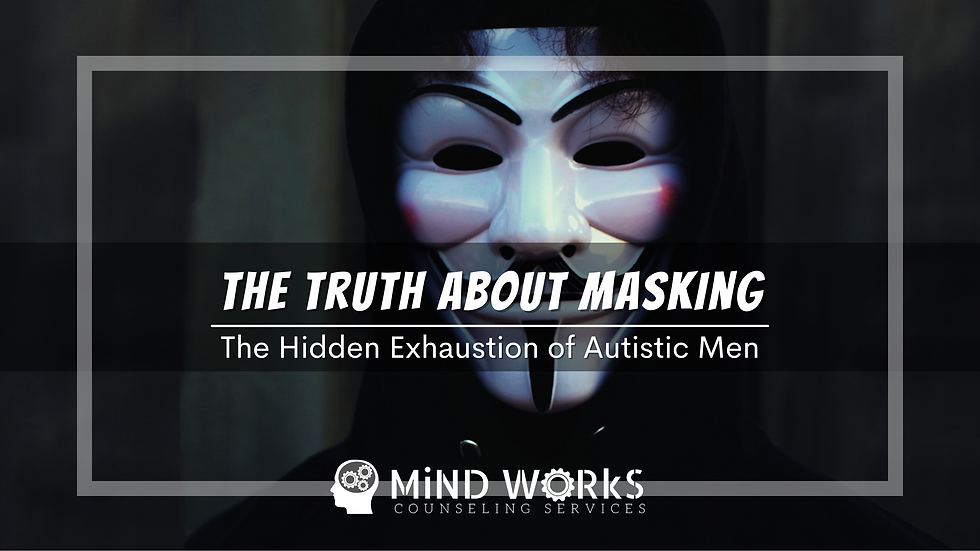The Truth About Masking: The Hidden Exhaustion of Autistic Men
- Joshuah Ellis, PhD, LPC

- Jul 4, 2025
- 3 min read
What People See vs. What You Live With
You show up to work. You smile. You make eye contact. You say the right things. Maybe you even joke around, keep it light, blend in. People think you’re fine. Maybe even socially smooth.
What they don’t see is the mental gymnastics it took to pull that off. The rehearsing, the second-guessing, the exhaustion that hits like a freight train once you're alone.

That’s masking. And for autistic men, it’s a full-time job you never applied for.
What Is Masking, Really?
Masking is when you hide your natural responses to fit in. You copy other people’s behaviors. You force eye contact even if it makes your skin crawl. You pretend to enjoy small talk. You laugh at the right times. You mimic what you think "normal" looks like.
And it works. Sort of. People don’t see you as weird. But they also don’t see you at all.
Why Men Do It
To survive social settings
To keep jobs or relationships
To avoid being labeled difficult or awkward
Because they were taught to "act normal" from a young age
One guy told me he spent years memorizing scripts for how to act at parties, how to respond to sarcasm, how to fake confidence. By his thirties, he was successful on paper but had no clue who he really was underneath the mask.
The Cost of Constant Performance
Masking might keep things smooth on the outside, but it burns you out from the inside.
You feel tired all the time, even if you didn’t do anything "hard"
You start to lose touch with what you actually enjoy or want
You feel anxious before social events and numb after
You wonder if people like you or just the version of you they see
It’s not just tiring. It’s lonely. Living behind a mask means no one really knows you. Not even you, sometimes.
How to Start Dropping the Mask
1. Know When You’re Doing It
Start by noticing. When are you most likely to mask? Around certain people? At work? Social events? Awareness is the first crack in the armor.
2. Give Yourself Permission to Be Different
Different doesn’t mean defective. If eye contact drains you or small talk bores you, that doesn’t make you broken. You’re wired differently. That’s not a flaw. It’s a fact.
3. Practice Dropping the Act in Safe Places
Find people or spaces where you can be real. That might be one friend, an online group, or just your own journal. Somewhere you don’t have to play a part.
4. Relearn What You Actually Like
Sometimes masking is so constant you forget what you actually enjoy. Start experimenting. What music do you like? What clothes feel good? What makes you feel most like yourself?
5. Rest Without Guilt
Masking takes energy. So give yourself real downtime. No more pushing through just to meet social expectations. Rest isn’t laziness. It’s recovery.
You Don’t Have to Be On All the Time
There’s nothing wrong with learning social skills. But living your whole life behind a performance? That’s not living. That’s acting.
You don’t have to unmask everywhere, all the time. But start somewhere. Even a little less masking is a lot more freedom.
You’re not alone. You’re not broken. And you don’t have to keep pretending.
At Mind Works Counseling Services in Lubbock, we specialize in helping men just like you who have autism.
Learn more about the Autism Counseling services we offer.
Contact us to schedule an appointment or to let us answer any questions you may have.
.jpg)



Comments